I would row 3,000 miles: Lancashire man and team Anna Victorious complete Talisker Whiskey Atlantic Challenge for cancer charity
and live on Freeview channel 276
Those 3,000 miles of Atlantic Ocean contain waves up to 40ft high, swarms of Portuguese man o' war jellyfish, great white sharks, and manta rays. They contain a uniquely profound sense of isolation and more open-air darkness than anywhere else on the planet.
To cross those 3,000 miles, it takes precisely 37 days, eight hours, and 58 minutes, over the course of which four rowers would have to make an estimated 1.5 million strokes. If you found four people willing to actually do it, that is.
Enter Adam Green, Ed Smith, Rob Murray, and Jack Biss.
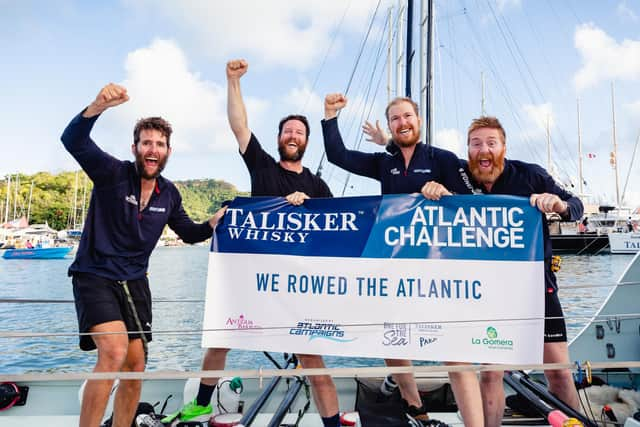

Advertisement
Hide AdAdvertisement
Hide Ad“In a weird way, 40 days at sea seemed quite appealing,” says Wigan-born Adam, who grew up in South Ribble. “It was the enormity of the challenge which excited me. It was too big to miss: if another mate had taken my place, I’d have looked back at it as a missed opportunity.
“I also thought it’d be a great way to switch off from everything,” he adds with a laugh. “A chance to be in the moment and just row.”
Tackling the gargantuan challenge - more people have climbed Mount Everest than have rowed the Atlantic - as part of the Talisker Whiskey Atlantic Challenge, the quartet were not short on motivation, however.
Rowing as part of team Anna Victorious, they shouldered the challenge in order to raise £100,000 for Victoria's Promise, a charity which supports young women aged 18-50 and their families through cancer and the charity which supported Ed’s late wife Anna after she was diagnosed with bowel cancer in 2017 having just become a new mother to baby Alba.
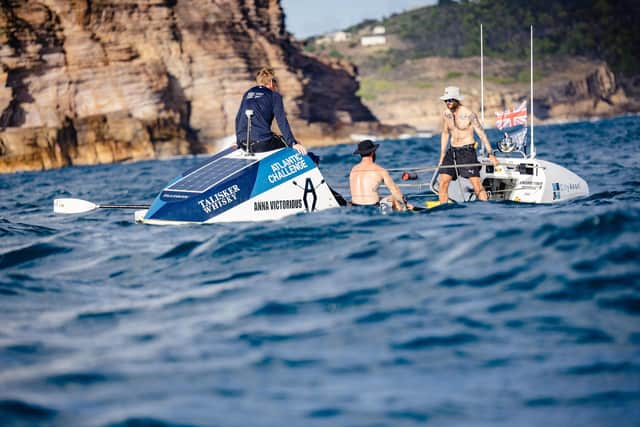

Advertisement
Hide AdAdvertisement
Hide AdTragically, the cancer spread to her liver and lungs. Despite chemotherapy and radiation, Anna died at 38.
“I felt I had a responsibility to get involved,” says Adam, who has undertaken a litany of challenges alongside friend Ed in the past, including the 24km SAS Fan Dance march in the Brecon Beacons three times over a weekend with a 20kg backpack. “Me and my wife Phillipa are actually godparents to Alba.
“So, when rowing the Atlantic was mentioned, my first thought was ‘that’d be amazing’.
The first two priorities were fundraising and preparation. Initially, they needed to raise £120k to cover the cost of their £60k 28ft boat as well as costs for training, accommodation, and supplies. After two years, they reached their target. Next came the physical and mental prep.
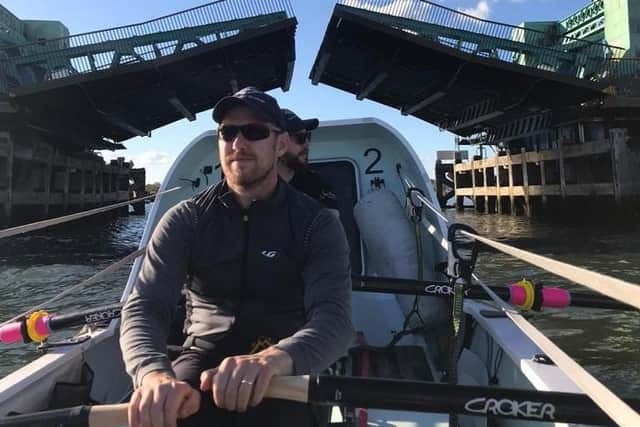

Advertisement
Hide AdAdvertisement
Hide AdTraining with Dan Harris from GB rowing, who designed bespoke strength programmes for the four, and with Tom Young, a psychologist and high-performance specialist based in Preston, the quartet made every effort to ensure they were physically and mentally fit.
Charged with consuming 8,500 calories a day whilst on the boat, they were also helped by Adam’s wife Phillipa, a nutritionist, to ensure they were properly fuelled - a culinary endeavour which meant a lot of freeze-dried food, nuts, and chocolate.
And, what’s more, Adam wasn’t going into the challenge unprepared: having raced at Reading Rowing Club before switching to indoor rowing two years ago and ranking fifth in the world over the half-marathon distance, he’d previously raced Sir Bradley Wiggins when the former cyclist tried to make one of the Olympic boats.
Nevertheless, the training was gruelling.
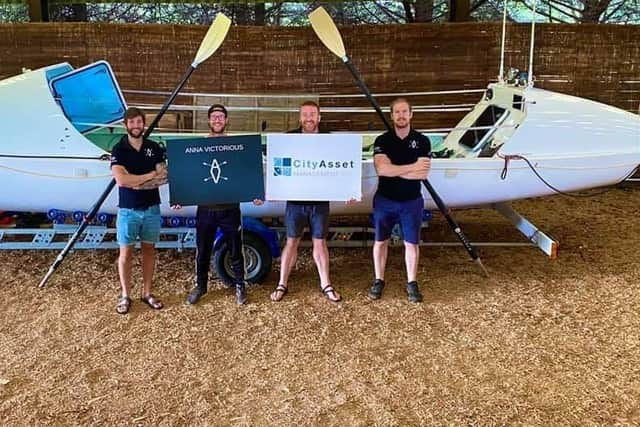

“This was on a different scale,” says Adam, 40. “We were at Team GB’s rowing park, which looked like a Formula 1 pit-stop, and I’m this out-of-place Northern lad glueing the sole of my shoe back on! But the coach looked at my numbers and said I was a lost prospect!
Advertisement
Hide AdAdvertisement
Hide Ad“Towards the end, we were doing 50km rows on the machines, which was soul-destroying because they judge you on every single stroke,” he adds. “It was awful and there were quite a few times when I thought ‘what have I got myself in for here?’”
Soon enough, however, the date came and, on December 12th, the crew set off alongside 37 other boats. The plan was to split into pairs and row in rolling two-hour shifts.
“That first day was all excitement and nervous energy,” says Adam. “As soon as we were away, it was like ‘wow, what have we done here?’ and then you lose sight of land, which is the real big one. We knew that rowing was our life for the next 37 days.
“From the start, the most important thing was our golden rules: don’t be late for shifts, get your calories, and keep morale high,” he adds. “We ran on adrenaline for the first five days but, after that, time just became a concept. The way we framed it was that every stroke was a stroke closer to home.
Advertisement
Hide AdAdvertisement
Hide Ad“It was mentally challenging,” explains Adam, who - as an engineer - was tasked with fixing anything which broke on the boat, including the water-maker and the navigation system’s compass. “The space was tiny and it’d be wet and dark at night and boiling hot during the day.
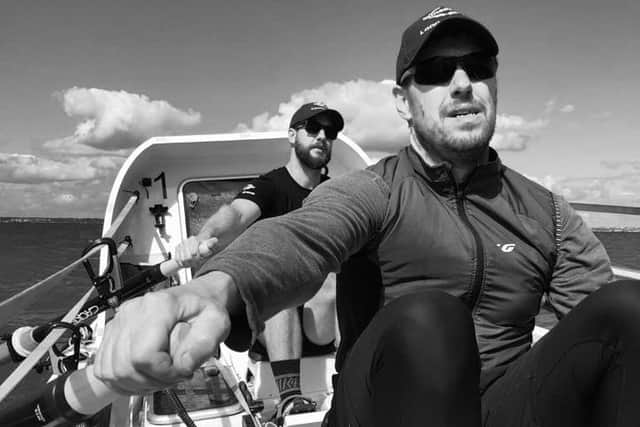

“I don’t deal well with heat and it must've been between 40°C in those cabins,” he adds. “It was unbearable. Then, at night, there’d be a massive scramble to get some sleep but you had to eat, hydrate, and change, so you were only really getting 80 minutes’ sleep tops.
“Some nights, you’d open the door to start your shift and, honestly, the weather…You just didn’t want to move. But you had to because your mate’s done it, so you had to crack on and focus on two-hour blocks. At one point, a rogue wave came over us in the pitch black. It was honestly terrifying.”
To make matters worse, Adam was also grappling with health issues. Living with early onset kidney disease and Ménière's disease, an inner ear condition which causes vertigo, he had intentionally kept his conditions from organisers for fear of being forbidden to take part.
Advertisement
Hide AdAdvertisement
Hide Ad“Halfway across the Atlantic, I got a urine infection,” says Adam. “I was in agony; my whole bladder felt like it was on fire and my whole body just wouldn’t cool down. It was terrifying because I didn’t want to damage my kidney and, on a really good day, you’re probably a day away from a tanker.
His fears assuaged by Rob’s sister, a GP specialising in UTIs, Adam soon recovered and got back into the swing of things, however.
“The hardest thing was being away from family but it was also an amazing experience,” he says. “One day when we were probably at our lowest ebb having just been overtaken by another crew, out of nowhere our boat was surrounded by pods of dolphins.
“And at night… you can’t put into words how dark it was and how many millions of stars you could see,” he adds. “It was out of this world - we’d literally spot a shooting star every 10 minutes.”
Advertisement
Hide AdAdvertisement
Hide AdAlmost 40 days after leaving, the crew finally made landfall, an achievement Adam calls ‘insane’. “It was overwhelming,” he says. “Stepping onto that pontoon was bizarre because of how shaky our legs were, but the feeling of pride was unbelievable. I slept like a baby.
I ask Adam if he has any other adventurous plans in the offing. As a father to four-year-old Arabella and seven-year-old Iris, however, he says nothing is imminent.
“I put my family through a lot, so they’re the focus now,” he explains. “In terms of the future…The other day, my dad said ‘do you think you’ll run a marathon?’ and I was just like ‘come on dad, I’ve just rowed the Atlantic, give me a break!’”
To donate, head to www.justgiving.com/fundraising/annavictorious